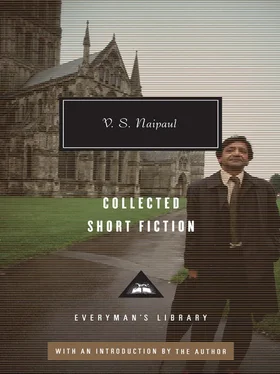Mrs Cooksey giggled, enjoying my disappointment. ‘She’s there all right. But in her nesting-box !’ I saw a small wooden box hanging at the back of the cage. Mrs Cooksey tapped it. ‘Come out, Yellow. Let Uncle have a look at you. Come out, come out. We know where you are.’ Through the round hole of the box a little yellow head popped out, restlessly turning this way and that. Mrs Cooksey tapped the box again, and Yellow slipped out of the box into the cage.
Yellow was smaller than Greenie or Bluey. She wandered about the cage fussily, inquisitively. She certainly had no intention of going to sleep just yet, and she wasn’t going to let Greenie sleep either. She hopped up to where he stood on his bar, his head hunched into his breast, and pecked at him. Greenie shook himself but didn’t open his eyes. Yellow gave him a push. Perhaps it was chivalry — though I had never credited Greenie with that — or perhaps he was just too sleepy. But Greenie didn’t fight back. He yielded and yielded until he could move no further. Then he went down to the other bar. Yellow followed. When she had dislodged him a second time she lost interest in him and went back into her nesting-box.
‘D’you see?’ Mrs Cooksey said. ‘She’s interested. The man at the shop says that when they’re interested you can expect eggs in ten days.’
‘Twelve, Bess.’
‘He told me ten.’
I tried to get them off the subject. I said, ‘They’ve got a new cage.’
‘Mr Cooksey made it.’
Mr Cooksey pop-popped.
He had painted it too. With the blue paint.
Yellow pushed her head through the hole of her box.
‘Oh, she is interested.’ Mrs Cooksey replaced the blue cloth on the cage. ‘We mustn’t be naughty. Leave them alone.’
‘One of my cleaners,’ Mr Cooksey said, pausing and throwing the possessive adjective into relief, ‘one of my cleaners keeps chickens and turkeys. Makes a packet at Christmas. Nabsolute packet.’
Mrs Cooksey said, ‘I wouldn’t like to sell any of my little Greenies and Yellows.’
Abruptly I remembered. ‘Where’s Bluey?’
I don’t think Mrs Cooksey liked being reminded. She showed me where Bluey’s cage was, on the floor, overshadowed by an armchair and the bookcase that had few books and many china animals. Alone among the luxurious furnishings of his cage, Bluey stood still, on one foot, his feathers ruffled, his head sunk low.
‘I can’t throw him out, can I?’ Mrs Cooksey shrugged her shoulders. ‘I’ve done my best for him.’
The love life didn’t agree with Greenie.
‘She’s taming him,’ Mrs Cooksey said.
He had certainly quietened down.
‘P’raps he’s missing Bluey,’ Mr Cooksey said.
‘Hark at him,’ said Mrs Cooksey.
Yellow was still eager, restless, inquisitive, going in and out of her box. Mrs Cooksey showed me how cleverly the box had been made: you could slide out the back to see if there were eggs. She counted the days.
‘Seven days now.’
‘Nine, Bess.’
‘Seven.’
Then: ‘Greenie’s playing the fool,’ Mr Cooksey said.
‘Look who’s talking,’ Mrs Cooksey said.
Two days later she met me in the hall and said, ‘Something’s happened to Greenie.’
I went to look. Greenie had the same unhealthy stillness as Bluey now: his feathers were ruffled, his eyes half-closed, his head sunk into his breast. Yellow fussed about him, not belligerently or playfully, but in puzzlement.
‘She loves him, d’you see? I’ve tried to feed him. Milk from an eye-dropper. But he isn’t taking a thing. Tell me where it hurts, Greenie. Tell Mummy where.’
It was Friday. When Mrs Cooksey rang up the RSPCA they told her to bring Greenie in on Monday. All during the weekend Greenie deteriorated. Mrs Cooksey did her best. Although it was warm she kept the electric fire going all the time, a luxury the Cookseys denied themselves even in winter. A towel was always warming in front of the fire. Greenie was wrapped in another towel.
On Monday Mrs Cooksey wrapped Greenie in a clean towel and took him to the doctor. He prescribed a fluid of some sort and warned Mrs Cooksey against giving Greenie milk.
‘He said something about poison,’ Mrs Cooksey said. ‘As though I would want to do anything to my Greenie. But you should have seen the doctor. Doctor! He was just a boy. He told me to bring Greenie again on Friday. That’s four days.’
When I came in next evening, my fingers stained with blue paint from the door, Mrs Cooksey met me in the hall. I followed her into the room.
‘Greenie’s dead,’ she said. She was very calm.
The door opened authoritatively and Mr Cooksey came in, mackintoshed and bowler-hatted.
‘Greenie’s dead,’ Mrs Cooksey said.
‘Pop-pop.’ Mr Cooksey took off his hat and mackintosh and rested them carefully on the chair next to the sideboard.
In the silence that followed I didn’t look at the Cookseys or the cage on the sewing machine. It was dark in the corner where Bluey’s cage was and it was some moments before I could see things clearly. Bluey’s cage was empty. I looked up at the sewing machine. He was in the cage with Yellow; he drooped on the floor, eyes closed, one swollen foot raised. Yellow paid him no attention. She fussed about from bar to bar, with a faint continuous rustle. Then she slipped through the hole into the nesting-box and was silent.
‘She’s still interested, ’ Mr Cooksey said. He looked at Bluey. ‘You never know.’
‘It’s no good,’ Mrs Cooksey said. ‘She loved Greenie.’ Her old woman’s face had broken up and she was crying.
Mr Cooksey opened doors on the sideboard, noisily looking for cocktails.
Mrs Cooksey blew her nose. ‘Oh, they’re like children. You get so fond of them.’
It was hard to think of something to say. I said, ‘We were all fond of Greenie, Mrs Cooksey. I was fond of him and I am sure Mr Cooksey was too.’
‘Pop-pop.’
‘Him? He doesn’t care. He’s tough . D’you know, he had a look at Greenie this morning. Told me he looked better. But he’s always like that. Look at him. Nothing worries him.’
‘Not true, Bess. Was a trific shock. Trific.’
Yellow never came out of her nesting-box. She died two days later and Mrs Cooksey buried her in the garden, next to Greenie. I saw the cage and the nesting-box, smashed, on the heap of old wood Mr Cooksey kept in the garden shed.
In the Cookseys’ sitting-room Bluey and his cage took their place again on the sewing machine. Slowly, week by week, Bluey improved. The time came when he could stand on both feet, when he could shuffle an inch or two on the floor of his cage. But his feet were never completely well again, and the growths on his beak didn’t disappear. The trapezes never swung and the ferris wheel was still.
It must have been three months later. I went down one Saturday morning to pay Mrs Cooksey for the milk. I had to get some change and she had to hunt about for her glasses, then for the vase in which she kept small change. She poured out buttons from one vase, pins from another, fasteners from a third.
‘Poor old lady,’ she kept on muttering — that was how she had taken to speaking of herself. She fumbled about with more vases, then stopped, twisted her face into a smile and held out her open palm towards me. On it I saw two latch keys and a small white skull, finished, fragile.
‘Greenie or Yellow,’ she said. ‘I couldn’t really tell you which. The sparrows dug it up.’
We both looked at Bluey in his cage.
1957
WE HEARD ABOUT the Dakins before they arrived. ‘They’re the perfect tenants,’ Mrs Cooksey, the landlady, said. ‘Their landlady brought them to me personally. She says she’s sorry to lose them, but she’s leaving London and taking over a hotel in Benson.’
Читать дальше









